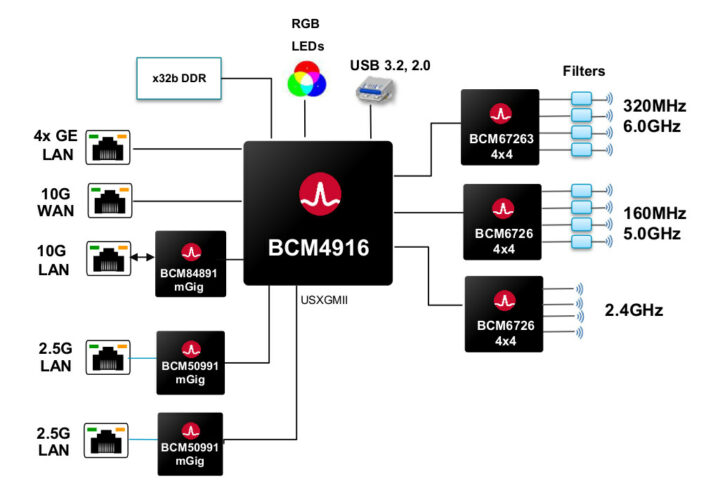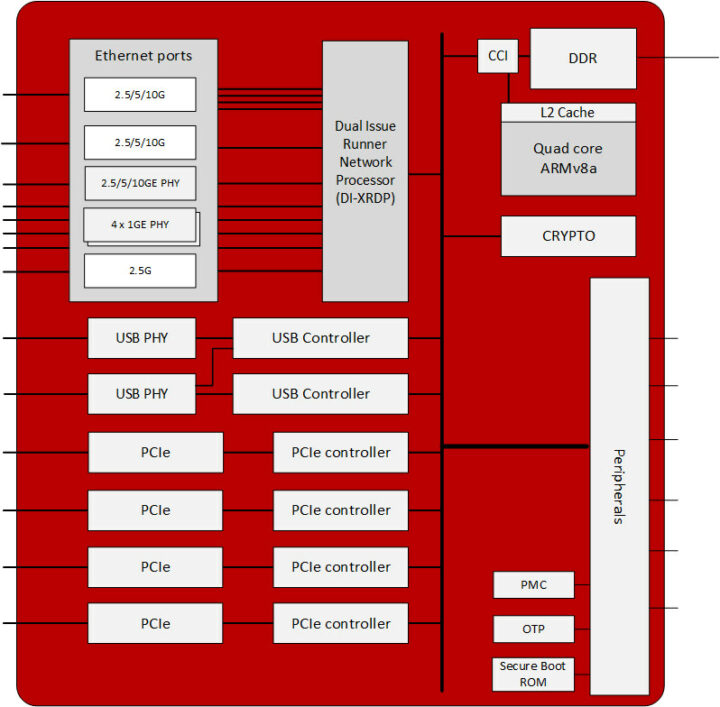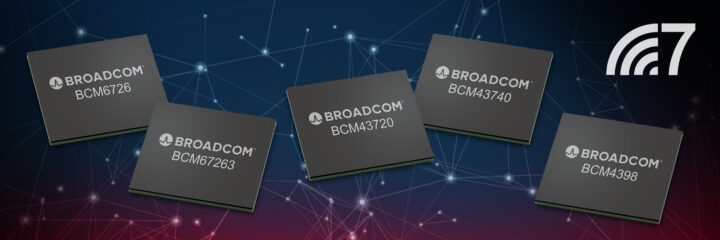We first noticed the new WiFi 7 (802.11be) standard in January 2022 with MediaTek demonstrating Filogic 802.11be processors, and later Qualcomm introduced the FastConnect 7800 WiFi 7 and Bluetooth 5.3 solution for wireless clients, but we had not seen anything for WiFi 7 access points yet.
Broadcom has now announced four WiFi 7 chips for access points with the BCM67263, BCM6726, BCM43740, and BCM43720 up to 11.5 Gbps PHY rate, plus the BCM4398 Wi-Fi 7 and Bluetooth 5 combo chip for mobile handsets with up to 6.05 Gbps PHY rate. We’ve not quite at the theoretical 40+ Gbps PHY rate for WiFi 7, but those solutions will more than double the speed of existing Wi-Fi 6/6E solutions, while simultaneously delivering lower latency and extending range.
The BCM67263 and BCM6726 chips are designed for the residential Wi-Fi 7 access point market with the following key features:
- Support for 4 streams of Wi-Fi 7
- 4096-QAM modulation
- Multi-link operation (MLO)
- Automated Frequency Coordination (AFC)
- Full compliance with IEEE and WFA Wi-Fi 7 specifications
- BCM67263
- Single radio that supports 6 GHz band
- Up to 11.5 Gbps PHY rate
- Up to 320 MHz channel bandwidth
- BCM6726
- Single radio that supports 2.4 GHz, 5 GHz, or 6 GHz bands
- Up to 5.75 Gbps PHY rate
- Up to 160 MHz channel bandwidth
Both chips can be used in routers, residential gateways, Wi-Fi extenders, and Wi-Fi mesh configurations.
The BCM43740 and BCM43720 are designed for the enterprise Wi-Fi access point market, and offer the following features:
- 4096-QAM modulation
- Multi-link operation (MLO)
- Automated Frequency Coordination (AFC)
- Full compliance with IEEE and WFA Wi-Fi 7 specifications
- Single radio that supports 2.4 GHz, 5 GHz, or 6 GHz bands
- BCM43740
- Support for 4 streams of Wi-Fi 7
- Up to 11.5 Gbps PHY rate
- Up to 320 MHz channel bandwidth
- BCM43720
- Support for 2 Streams of Wi-Fi 7
- Up to 2.88 Gbps PHY rate
- Up to 160 MHz channel bandwidth
These devices are optimized to be used in enterprise Wi-Fi access points. The only differences that I can find between residential and enterprise chips are that the latter are also available in the -40°C to 85°C industrial temperature range, and TKIP security protocol is not listed in the enterprise chips.
None of those chips are complete SoCs, and instead, they would be connected through a PCIe interface to a processor such as Broadcom BCM4916 quad-core Armv8 B53 CPU with integrated 10G/5G/2.5G multi-Gig PHY as illustrated in the diagram below.

Note that BCM4916 is for “residential access point (AP) applications”. 10GbE networking used to be for enterprise networks, but with WiFi 7 and fiber plans up to 5Gbps (and soon 10 Gbps), it may make sense to go up the scale in some home networks as well.

Let’s switch to the WiFi 7 client chip. Broadcom BCM4398 specifications highlights:
- Support for 2-stream Wi-Fi 7
- 320 MHz channel bandwidth
- 6.05 Gbps PHY rate
- 4096-QAM modulation
- Client multi-link operation (MLO)
- Compliance with IEEE and WFA Wi-Fi 7 standards, as well as Bluetooth 5.2
Broadcom did not say when commercial devices based on their WiFi chips will be available, but the company is currently sampling its Wi-Fi 7 chips to early access partners and customers in the mobile, enterprise, service provider, and retail segments. We should probably expect H2 2022 availability since it’s the target for Qualcomm FastConnect 7800.
More details may be found on the product pages for the residential and enterprise access point chips, as well as the BCM4398 product page.
Via the press release, Anandtech, and thanks to TLS for the tip.

Jean-Luc started CNX Software in 2010 as a part-time endeavor, before quitting his job as a software engineering manager, and starting to write daily news, and reviews full time later in 2011.
Support CNX Software! Donate via cryptocurrencies, become a Patron on Patreon, or purchase goods on Amazon or Aliexpress






It’s a terrible shame Broadcom is so open-source hostile. There are a metric f*ckton of otherwise great routers and switches and whatnot out there, but they can’t be used with OpenWRT because of Broadcom’s hostility.
Probably open source community is not a problem.
I basically avoid all Broadcom based product as much as possible.
The only exception so far are the WiFi chips in SBCs.
I have enterprise gear with BCM hw in it and I’ve used expansion cards from other vendors to avoid using their BS drivers.
Oh and I have (unfortunatly) HBA controllers from them…
@Nicolò said: “I basically avoid all Broadcom based product as much as possible.”
Me too. I run Linux/xBSD and have been seriously burned by the lack of Broadcom drivers.
broadcom is expensive and close sourced which means – no dice
“We’ve not quite at the theoretical 40+ Gbps PHY rate for WiFi 7, but those solutions will more than double the speed of existing Wi-Fi 6/6E solutions”
Not quite, since there are Wifi 6E solotuions that go beyond 5.8 Gpbs, which is more than half of the promised 12.5 Gpbs. One such from Netgear: https://www.netgear.com/home/wifi/wifi6e/